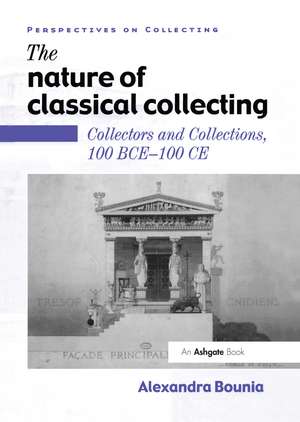The Nature of Classical Collecting: Collectors and Collections, 100 BCE – 100 CE: Perspectives on Collecting
Autor Alexandra Bouniaen Limba Engleză Hardback – 28 oct 2004
Preț: 764.20 lei
Preț vechi: 1027.43 lei
-26% Nou
Puncte Express: 1146
Preț estimativ în valută:
146.23€ • 156.37$ • 121.92£
146.23€ • 156.37$ • 121.92£
Comandă specială
Livrare economică 28 martie-11 aprilie
Doresc să fiu notificat când acest titlu va fi disponibil:
Se trimite...
Preluare comenzi: 021 569.72.76
Specificații
ISBN-13: 9780754600121
ISBN-10: 0754600122
Pagini: 370
Ilustrații: Includes 31 illustrations
Dimensiuni: 153 x 219 x 26 mm
Greutate: 0.45 kg
Ediția:New ed
Editura: Taylor & Francis
Colecția Routledge
Seria Perspectives on Collecting
Locul publicării:Oxford, United Kingdom
ISBN-10: 0754600122
Pagini: 370
Ilustrații: Includes 31 illustrations
Dimensiuni: 153 x 219 x 26 mm
Greutate: 0.45 kg
Ediția:New ed
Editura: Taylor & Francis
Colecția Routledge
Seria Perspectives on Collecting
Locul publicării:Oxford, United Kingdom
Cuprins
Contents: Preface; Introduction; Reading ancient texts: methodological approaches to interpretation and appropriation. Part I Notions of collecting in the ancient world: Collecting material testimonies: antiquarianism and notions of the past; 'Gifts-to-men and gifts-to-gods': defining (collecting) values; The concept of the individual as a cultural category: its implications in classical collecting; Collecting in time and space in the classical world. Part II Classical collectors and collections: Visiting Pliny's collection: reading a 'museum'; Poet's gifts, collector's worlds: the epigrams of Martial; 'Luxury is not for everybody': collecting as a means of sharing cultural and social identity; 'Furnishing' the collector's world: Cicero's Epistulae and the Verrine Orations. Conclusions; Bibliography; Index.
Recenzii
'Museology students will find the theoretical introduction and discussions of methodological approaches especially useful. Anyone with an interest in the history of museums will be able to mine the text for fascinating facts and insightful ideas, and gain an overall impression of a collecting period that has remained hidden up until now.' Museum and Society
Descriere
Contrary to general traditional belief, the origins of collecting, as a systematic activity that refers to the satisfaction of symbolic rather than actual needs, was not an invention of the Renaissance. Collecting made its first appearance in European prehistory, was a subject of interest and debate for the ancient Greeks and Romans, and has been present continuously ever since. The Nature of Classical Collecting is the first thorough discussion of collecting in the ancient classical world. Based on extensive research of the literary sources available, and complemented, wherever necessary, from references to archaeological and epigraphic evidence, it is a thought-provoking attempt to consider a phenomenon which has been in the centre of the western mind set since its very early origins.



